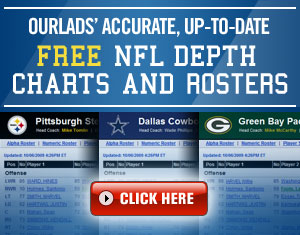SPECIAL TO OURLADS BLOG by Matt Waldman
The following blog is a reprint by permission of the fifth in a series of five articles by Matt Waldman that was posted on his blog: http://mattwaldmanrsp.com/
I think it’s accurate to describe Ourlads’ Dan Shonka as one of the ultimate practitioners of football evaluation. Shonka has 39 years of football experience as a player, college recruiter, college coach, and a combine 16 years as a NFL scout for National Scouting Service, the Philadelphia Eagles, the Washington Redskins, and the Kansas City Chiefs.
Last week, Shonka agreed to speak with me about scouting, players, and the NFL. The scheduled 60 minutes became two hours of football talk that flew by. Dan was afraid I got more than I bargained for, but I told him that I got exactly what I wanted – just more than I could have expected.
In this final installment of our conversation, Shonka tells how he became an NFL Scout and shares some of his experiences in the field.
Waldman: When and how did you get your first job as an NFL Scout?
Shonka: I coached on a variety of levels (see link at top of page for Shonka’s bio), but the way I got the job was kind of funny. I was coaching at New Mexico Highlands when Billy Kuharich from the New Orleans Saints called me because I had worked for him with the Philadelphia Stars (USFL). He asked me if I wanted to scout for him.
I told him no because I wanted to continue coaching. But I continued to think about it. The next year I called National Football Scouting, which is the biggest combine for the NFL, and they wouldn’t even take my call! Somebody told me that they get like 50 phone calls a week from people wanting to scout.
Then out of the blue, my father in-law was very ill and my wife and I moved back to Cedar Rapids to be near him. I told my wife I’d find a job there. While were in New Mexico I had visited with one of the more successful coaches in the Rocky Mountain Conference and he told me, “Dan I win 9-10 games every year and I never get a phone call about another coaching job.”
So I told Peggy, even though I’ve turned this program around it’s probably not going to be a stepping-stone so let’s go back to be with your father and I’ll find a job doing something. So we moved back to Iowa and I’m there probably a month to six weeks when I got a call from National Football Scouting.
They wanted to know if I’d be interested in scouting and if I would they’d send me a plane ticket to come see them. Long story short, I was actually hired simultaneously by the last director of national scouting Harry Buffington and Duke Babb the new director. It was Duke’s first hire and Harry’s last hire so that’s how I got into it.
I was recommended by John Fitzpatrick. He used to scout for National and he came through my area when I was at New Mexico Highlands and I knew him when he played at Purdue. He knew anyone who could work for Jim Young could certainly be an NFL scout. I was with National Football Scouting for seven years.
Waldman: How did you get with the Eagles?
Shonka: This one is a weird story. One of the scouts, Ray Biggs who was with National Scouting called me and said, “Dan the Eagles want to hire you as a scout and they left a message on my phone.”
(Laughter)
You know Matt, I really didn’t have to have an emblem on my shirt or something like that to do this job. I just really enjoyed player-personnel work. I enjoyed scouting. I loved recruiting.
When I was a recruiter at the different universities and colleges I loved it. But I called Philadelphia back through Ray and they said that they wanted to bring me in for an interview and that Jeff Lurie wanted to visit with me.
What they do at the Combine meetings is evaluate scouts’ reports. Well, I was the top-rated scout for four years in a row at National Scouting and they put a grade and kept track of how your draft choices go, which is kind of crazy because you’re doing stuff for 20 teams and each team is looking for something different. But Lurie saw these reports after he took over the Eagles and Joe Banner went through the stuff, too. So they invited me for an interview.
John Wooten who was the director at the time knew me through National Football Scouting and long story short I interviewed and they hired me. That’s how I got started.
Waldman: You mentioned Jimmy Young and the USFL, can you tell me about those experiences?
Shonka: Jim Young was at Purdue at the time I worked with him. Bill Kuharich was in the USFL and my boss was Carl Peterson. He was the GM for the Philadelphia Stars. When I was the head football coach at Independence Junior College, the Stars were looking for someone to be a part-time scout in that area so I scouting for them.
I’d go out to the different universities for the Stars for about a year. It was the year before the USFL folded. I remember Billy Kuharich calling me and telling me, “Listen, if you get another part-time job scouting you better get it because the league is about ready to fold.”
It was a little different. The offices of the Stars were actually in Veterans Stadium. As an area scout for the Philadelphia Stars we never actually went into Philadelphia for our draft meetings we did it by speakerphone. Rod Graves was one of the scouts. Tommy Marino. Carm Piccone. We had a pretty good group that went into the NFL sooner or later.
I had the Midwest area. At that time they could get reports from different teams. One time, Billy Kuharich looked at my reports and told me the two tackles I had on my list at the University of Kansas weren’t even on the New York Giants’ list. I said, “If you want to hire them as your scout go ahead. I recruited both of those guys so I know they can play.”
Billy laughed at that and both guys ended up playing in the NFL – Renwick Atkins and Reggie Smith. In fact Renwick was drafted by both leagues and Reggie was picked up by the Broncos after the USFL folded when he was with the Tampa Bay Bandits.
Anyway, I probably had more dialogue with Bill and Carl. It was Carl who actually wound up hiring me for the Kansas City Chiefs down the line. It was with the Stars that I got to know him a little bit.
Waldman: What aspects of coaching and scouting do you enjoy that is unique to their roles?
Shonka: I really loved the personal interaction with the players, game plans, and things like that when you’re coaching. When I was at a major college and I had my own scouting area or my own position to coach that was great. But once you become a head coach you spend more time putting out fires and doing all kinds of other stuff other than coaching. And the reason you get into coaching is that you like working with these guys and helping them become better players. You like to associate with the guys and try to put a team together that you could turn around.
That was my big thing. I loved recruiting so I could get the personnel to turn around a poor football program. All the programs I took over were either 0-9 or 1-8 when I took them over. We’d gradually get the teams better. With some of these programs if you go 6-5 after you were a 1-9 team its big, big progress. I liked building a program and doing that through personnel work.
I just liked recruiting and evaluating players to see if those guys could contribute for you. I always liked it. In fact, I coached little league teams of 10 year-old baseball teams when I was 13 years-old and when they’d have a draft I used to study those guys when they were 9 year-old kids to see I’d eventually want to have them on my team!
(Laughter)
It’s just something that’s in your blood and there are a lot of people who are very good at different things. You have great writers like Malcolm Gladwell. He’s a great writer, always wanted to be a writer. Everybody has got something that they’re good at. Sometimes you find it, sometimes you don’t. I found out a long time ago that player-personnel work was something that I enjoyed doing and as I said I didn’t need to have an emblem on my shirt to enjoy doing it.
Waldman: What was it like with National?
Shonka: For National Football Scouting you’re working for 20 teams. You do your reports, you turn them in, and then you report to the teams at your different meetings in the fall and the spring. A lot of people always looked at that as a stepping-stone to the NFL, but it never crossed my mine. I never looked at the next job while I was in the job I was in.
Some people might think that’s dumb, but I felt like that any time that I wasn’t spending on my job I was not being fair to my employer or my team. I wanted to work for that team. When my contract was up or something like that then I was pretty lucky because I always had someone looking for me.
It all just kind of ties in, Matt: the evaluation of the players, the recruiting, the scouting, and it turned into being a full-time scout. Even when you’re coaching at different universities you scout other teams. You’re looking at their plays.
When I was a graduate assistant at Iowa State you would travel to different places and look at the offense, the defense, and personnel for other teams. I enjoyed that. I always felt I was good at it. I always felt like I had a knack for it just like some people have a knack for the violin, the piano, or the written word.
It’s frustrating at times because I would know that a player could play and I would be jumping on the table and people would be fighting me saying that this guy isn’t worth a shit. It kind of bothers you. Nevertheless I was always lucky regarding the teams I worked for because they would let me sign free agents and it would pay off for them.








 Box 235 Hiawatha, IA 52233
Box 235 Hiawatha, IA 52233